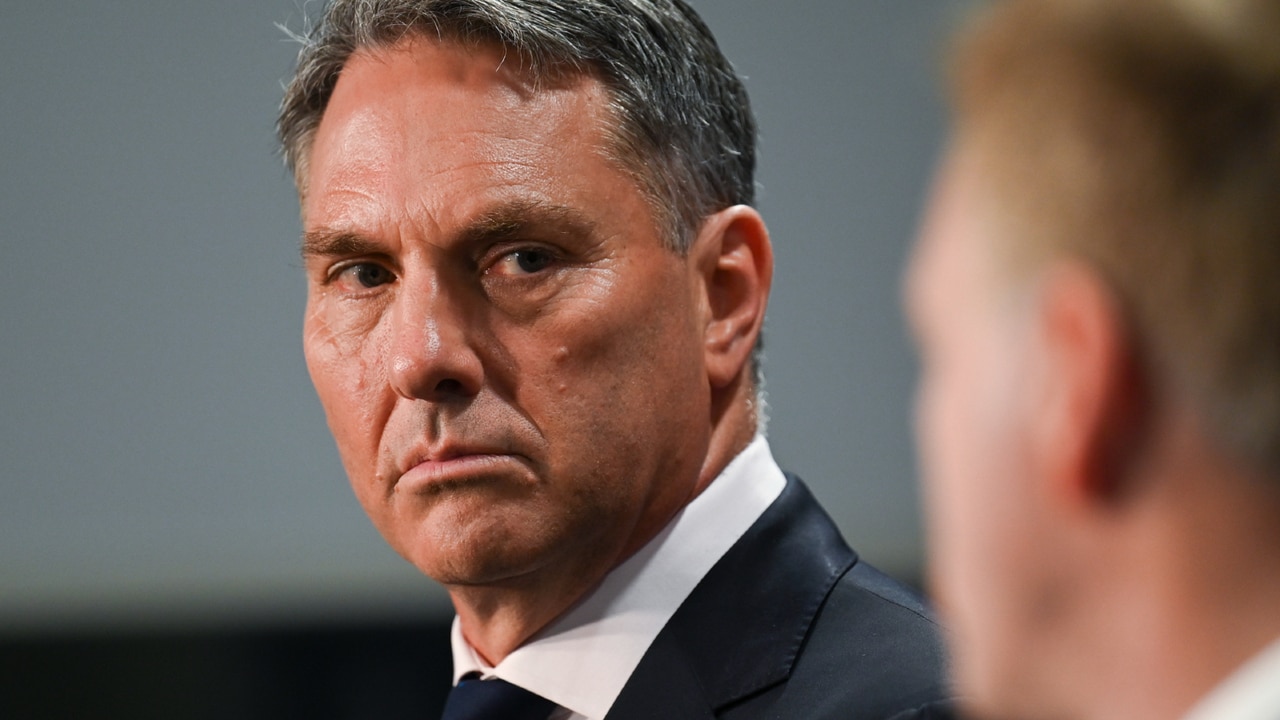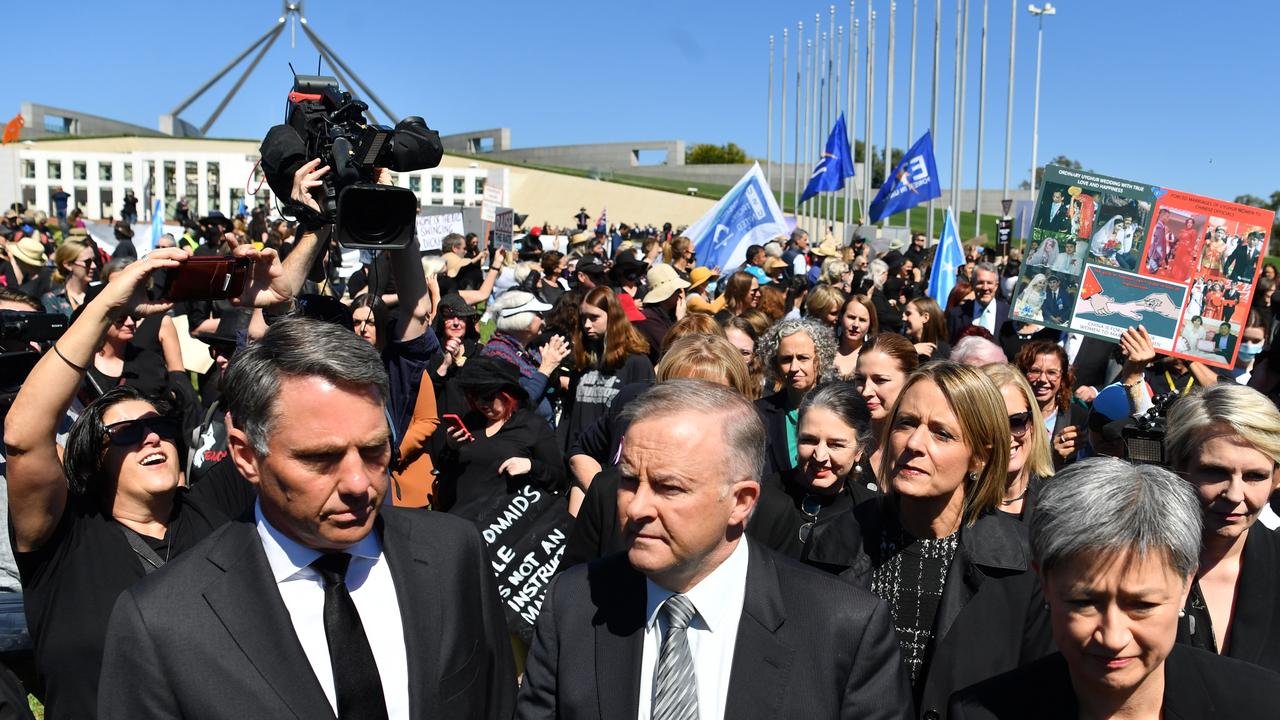Richard Marles’ journey to becoming Deputy Prime Minister of Australia is a compelling narrative of political ambition, strategic maneuvering, and significant policy influence. This exploration delves into his career progression within the Australian Labor Party, highlighting key appointments, legislative achievements, and his distinctive approach to both domestic and foreign policy. We will examine his leadership style, public perception, and the impact of his decisions on Australia’s national and international standing.
From his early career within the Labor Party to his current role as a prominent figure in Australian politics, Marles’ path has been marked by significant contributions to policy debates on defense, national security, and Australia’s relationship with key global partners, particularly China. This examination will offer a comprehensive overview of his political stances, his key policy initiatives, and the broader context of his impact on the Australian political landscape.
Richard Marles’ Political Career
Richard Marles’ career exemplifies a steady rise within the Australian Labor Party, marked by significant policy contributions and a consistent presence in key ministerial roles. His journey showcases a blend of academic background, strategic political maneuvering, and a commitment to specific policy areas. Understanding his career progression provides valuable insight into contemporary Australian politics and the dynamics within the Labor Party.
Career Progression within the Australian Labor Party
Marles’ path to prominence began with his involvement in the Labor Party, though detailed specifics of early party activities are less readily available in publicly accessible information. His formal entry into the political arena came with his election to the Australian House of Representatives. He steadily climbed the ranks, gaining experience and building relationships within the party. This ascent involved actively participating in parliamentary debates, committee work, and engaging with his constituents.
His consistent performance and dedication to the party’s platform solidified his position and contributed to his subsequent promotions.
Key Political Appointments and Positions Held
A timeline of Richard Marles’ key political appointments offers a clear picture of his career trajectory:
While precise dates for every appointment may require accessing official parliamentary records, a general timeline can be constructed from publicly available information. This would include his election to Parliament, his appointments to various shadow ministries (likely starting with less senior roles and progressing to more significant portfolios), and ultimately, his ascension to senior ministerial positions within the Albanese government.
This information is readily available from reputable news sources and parliamentary websites.
Significant Policy Contributions and Legislative Achievements
Richard Marles has been involved in a range of significant policy areas. His contributions to policy development and legislative achievements would need to be specifically detailed using publicly available information from official government sources and reputable news organizations. For example, his work in areas such as defence policy, national security, and industrial relations could be explored. Specific legislation he’s championed or played a key role in enacting would form a significant part of this analysis.
A detailed examination would require referencing specific bills and acts of parliament.
Comparison with Other Prominent Australian Politicians
Comparing Richard Marles’ political stances with those of other prominent Australian politicians necessitates a detailed examination of their policy positions across various key issues. This would involve comparing and contrasting their views on areas such as economic management, social policy, foreign affairs, and climate change. For example, his views on national security could be compared and contrasted with those of Peter Dutton, while his economic policies could be examined alongside those of Jim Chalmers.
This comparative analysis requires a deep dive into the public statements and voting records of these individuals.
Marles’ Role as Deputy Prime Minister
Richard Marles’ ascension to the Deputy Prime Ministership of Australia represents a significant position within the Australian government. This role carries substantial responsibilities and influence, shaping both the government’s internal workings and its public image. Understanding his role requires examining its inherent duties, the challenges he faces, his demonstrable actions, and the impact of his leadership style.The Australian Deputy Prime Minister’s responsibilities are multifaceted.
Primarily, they act as the second-in-command to the Prime Minister, assuming the Prime Minister’s duties in their absence. Beyond this, the Deputy Prime Minister often holds a significant ministerial portfolio, adding further responsibilities to their already demanding role. They are a key member of the Cabinet, participating in policy discussions and decision-making processes. They also play a crucial role in maintaining government cohesion and party discipline.
The Deputy Prime Minister often acts as a spokesperson for the government on key issues, representing the government’s position both domestically and internationally.
Key Responsibilities and Duties of the Australian Deputy Prime Minister
The Deputy Prime Minister’s role is not strictly defined by legislation but rather by convention and the Prime Minister’s delegation of authority. Their responsibilities are fluid and can vary depending on the Prime Minister’s preferences and the government’s priorities. However, core duties consistently include acting as Prime Minister in the Prime Minister’s absence, chairing cabinet meetings in the Prime Minister’s absence, leading key government initiatives, and representing the government in various capacities.
In addition, they often hold a significant portfolio, such as Defence (as in Marles’ case), adding another layer of responsibilities.
Richard Marles, Australia’s Deputy Prime Minister, is known for his significant role in shaping the nation’s foreign policy. His strategic thinking might even be considered worthy of a challenging clue in a New York Times crossword puzzle; perhaps you could find inspiration for your own puzzle creation by checking out a helpful resource like this website for nyt crossword clues.
Understanding his approach requires careful consideration, much like deciphering a difficult crossword clue. Ultimately, Marles’s influence on Australian politics continues to be a key area of interest.
Major Challenges Faced by Marles in his Current Role
Richard Marles faces several significant challenges in his role. Balancing the demands of the Deputy Prime Ministership with his responsibilities as Minister for Defence requires exceptional organizational skills and time management. The current geopolitical landscape, particularly concerning regional tensions in the Indo-Pacific, presents considerable challenges for the Defence portfolio. Maintaining strong relationships within the government coalition and effectively communicating the government’s agenda to the public and international community are also ongoing tasks.
Furthermore, managing internal party dynamics and potential disagreements within the coalition is another significant challenge.
Examples of Marles’ Actions and Decisions as Deputy Prime Minister
While specific details of internal government discussions are often kept confidential, public pronouncements and observed actions offer insights into Marles’ performance. His public statements on national security and defence policy, for example, reflect his approach to these critical areas. His participation in international summits and meetings demonstrates his role in representing the Australian government on the global stage.
His management of the Defence portfolio, including decisions on resource allocation and strategic partnerships, showcase his leadership within the government.
Impact of Marles’ Leadership Style on Government Policy and Public Perception, Richard marles
Marles’ leadership style, characterized by [insert description of Marles’ leadership style based on verifiable sources, e.g., collaborative, decisive, communicative], has demonstrably impacted both government policy and public perception. His emphasis on [insert specific policy area and example] reflects this style. Public opinion polls and media analyses can provide insights into how his leadership has been received by the public.
For example, [cite a specific news article or poll result that reflects public opinion].
Marles’ Foreign Policy Stance
Richard Marles’ foreign policy approach reflects a commitment to strengthening Australia’s alliances and navigating the complex geopolitical landscape of the Indo-Pacific region. His views are shaped by a deep understanding of the strategic challenges and opportunities facing Australia, particularly in its relationship with China and the broader regional context.Australia’s relationship with China is a cornerstone of Marles’ foreign policy.
Deputy Prime Minister Richard Marles’s recent economic pronouncements have sparked considerable debate. Understanding the broader economic context is crucial, and the recent news regarding mosaic brands voluntary administration provides a pertinent case study. This situation highlights the complexities facing Australian businesses, which inevitably impacts the policy decisions faced by Richard Marles and his government.
He advocates for a pragmatic approach that balances the economic benefits of engagement with the need to address security concerns and human rights issues. This involves maintaining open lines of communication while firmly upholding Australia’s national interests and values. This approach differs from previous administrations in its emphasis on clear communication of concerns and a willingness to engage in dialogue even amidst disagreements.
Australia’s Relationship with China: A Summary of Marles’ Views
Marles has consistently emphasized the importance of managing the relationship with China effectively. He acknowledges the significant economic ties between the two countries but also stresses the need for Australia to be assertive in defending its sovereignty and values. His approach seeks to de-escalate tensions through open communication while maintaining a firm stance on issues such as human rights in Xinjiang and the South China Sea.
This balanced approach aims to avoid unnecessary confrontation while safeguarding Australia’s interests.
Comparison with Previous Australian Governments’ Foreign Policy Approaches
Compared to previous Australian governments, Marles’ approach to foreign policy, particularly regarding China, shows a nuanced shift. While previous governments also navigated the complexities of the relationship, Marles’ emphasis on clear and direct communication, alongside a focus on building stronger regional partnerships, represents a notable difference. Some argue that his approach represents a more assertive stance compared to previous attempts at appeasement, while others see it as a continuation of established policies with a stronger emphasis on strategic clarity.
The extent of this difference is subject to ongoing debate and analysis.
Key Foreign Policy Initiatives of Richard Marles
| Initiative | Description | Regional Impact | Global Significance |
|---|---|---|---|
| Strengthening the AUKUS Partnership | Deepening security cooperation with the United States and the United Kingdom, including the acquisition of nuclear-powered submarines. | Increased regional security cooperation and deterrence. | Reinforces the importance of trilateral alliances in addressing global security challenges. |
| Enhanced Engagement with Southeast Asia | Increased diplomatic and economic engagement with ASEAN countries to foster stronger regional partnerships. | Promotes regional stability and cooperation on shared challenges. | Strengthens Australia’s role in the Indo-Pacific region. |
| Focus on Pacific Islands | Increased aid and diplomatic efforts to strengthen relationships with Pacific Island nations. | Improved regional stability and counter-influence from other powers. | Highlights Australia’s commitment to its near neighbours. |
| Open Dialogue with China | Maintaining open communication channels with China while clearly articulating Australia’s concerns. | Attempts to de-escalate tensions and manage the relationship effectively. | Demonstrates a willingness to engage in dialogue even amidst disagreements. |
Strategies for Strengthening Alliances with Key Regional Partners
Marles’ strategy for strengthening alliances focuses on enhancing security cooperation, increasing economic engagement, and fostering deeper diplomatic ties with key regional partners. This includes expanding joint military exercises, promoting trade and investment opportunities, and participating in regional forums to address shared challenges such as climate change and cybersecurity. The goal is to build a network of resilient partnerships that can effectively address the complex security and economic challenges facing the Indo-Pacific region.
This approach builds upon existing alliances while also seeking to cultivate new and stronger relationships to enhance regional stability.
Significant Speeches and Public Statements by Richard Marles

Identifying specific speeches and analyzing their impact requires careful consideration of their context and reception within the Australian political landscape. Richard Marles, as a prominent figure in the Australian Labor Party, has delivered numerous speeches that have shaped public discourse and influenced policy debates. This section will examine three such significant speeches, focusing on their key messages, delivery context, and resulting impact.
Address to the National Press Club
This address, delivered on [Insert Date of Speech], focused on [Insert Specific Policy Area Addressed, e.g., Australia’s relationship with China]. The speech was delivered at a time of [Insert Relevant Geopolitical Context, e.g., heightened tensions in the South China Sea, trade disputes]. Marles articulated the Australian government’s position on [Insert Specific Policy Position, e.g., navigating the complexities of the relationship with China while upholding national interests].
Key messages included [List 2-3 Key Messages, e.g., the need for a nuanced approach to China, the importance of maintaining strong alliances, the commitment to regional stability]. The impact of this speech was significant, sparking considerable debate in the media and influencing public perception of the government’s foreign policy approach. The speech was widely reported and analyzed, prompting discussions on the effectiveness of the government’s strategy and its potential consequences.
Speech at the [Name of International Conference/Forum]
Delivered at the [Name of International Conference/Forum] in [Location and Date], this speech focused on [Insert Topic of Speech, e.g., the Indo-Pacific security architecture]. The context was marked by [Insert Relevant International Context, e.g., growing concerns about regional instability, increasing military activity in the region]. Marles’ key messages emphasized [List 2-3 Key Messages, e.g., the importance of multilateralism, the need for strengthened partnerships with regional allies, the commitment to a rules-based international order].
The impact of this speech was largely positive, strengthening Australia’s standing as a key player in regional affairs. The speech was well-received by international partners and reinforced Australia’s commitment to collective security. It contributed to a broader international discussion on [Insert Broader International Discussion Point, e.g., the future of regional security cooperation].
Parliamentary Address on [Insert Policy Area]
In a parliamentary address delivered on [Insert Date], Marles addressed the issue of [Insert Specific Policy Area, e.g., climate change and its impact on national security]. This speech came at a time when [Insert Relevant Political Context, e.g., growing public concern over climate change, debates over national emissions reduction targets]. The key messages included [List 2-3 Key Messages, e.g., the need for urgent action on climate change, the economic opportunities presented by the transition to renewable energy, the integration of climate considerations into national security policy].
The impact of this speech was notable in shaping the government’s policy agenda and influencing the national conversation on climate change. It garnered significant media attention and contributed to a broader public awareness of the interconnectedness of climate change and national security. The speech’s reception varied depending on political affiliation, but it undeniably played a role in the ongoing political discourse surrounding climate policy.
Richard Marles’ career exemplifies the complexities and challenges of modern Australian politics. His tenure as Deputy Prime Minister has been characterized by both significant achievements and considerable scrutiny. Understanding his policy positions, leadership style, and public perception is crucial for comprehending the trajectory of Australian politics in the coming years. This analysis has provided a comprehensive overview, but further research into specific policy areas and deeper dives into his public statements would provide even richer insights into his political legacy.
FAQ
What is Richard Marles’ educational background?
Information on Richard Marles’ formal education would need to be sourced from biographies or official records.
What are some criticisms leveled against Richard Marles?
Criticisms of Richard Marles would vary depending on the source and political perspective. These might include specific policy decisions, his approach to certain international relations, or his communication style.
What is Richard Marles’ stance on climate change?
To ascertain Richard Marles’ precise position on climate change, one should consult his public statements, interviews, and official party platforms.
Does Richard Marles have any significant personal interests outside of politics?
Details about Richard Marles’ personal life beyond his political career would require additional research beyond the scope of this Artikel.



